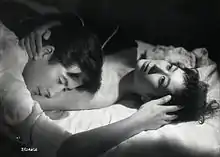The Eternal Breasts
The Eternal Breasts (乳房よ永遠なれ, Chibusa yo eien nare) is a 1955 Japanese drama film and the third film directed by actress Kinuyo Tanaka. It is based on the life of tanka poetess Fumiko Nakajō (1922–1954).[3]
| The Eternal Breasts | |
|---|---|
 Ryōji Hayama and Yumeji Tsukioka in The Eternal Breasts | |
| Japanese | 乳房よ永遠なれ |
| Directed by | Kinuyo Tanaka |
| Produced by |
|
| Written by | Sumie Tanaka |
| Starring |
|
| Music by | Takanobu Saitō |
| Cinematography | Kumenobu Fujioka |
| Edited by | Kimihiko Nakamura |
Production company | |
| Distributed by | Nikkatsu |
Release date |
|
Running time | 110 minutes[1] |
| Country | Japan |
| Language | Japanese |
Plot
Unhappily married Fumiko, mother of two children, divorces her husband after an incident which she regards as an act of unfaithfulness, and moves back to her mother. At the same time, she tries to find her voice as a poetess, regularly attending a poetry circle. While struggling with the divorce and the fact that she could only take her daughter with her, having to leave her son behind, she is diagnosed with late stage breast cancer. She undergoes a double mastectomy, which she writes about in a series of widely noticed poems, and tries to live her life as freely as possible and as her illness allows. She confesses to her friend Kinuko that she loves Kinuko's husband Hori (though keeping a distance, respecting their marriage), and has a short affair with journalist Ōtsuki who writes about her in a newspaper series, before she finally dies.
Cast
- Yumeji Tsukioka as Fumiko Shimojō, née Nakajō
- Ryōji Hayama as Akira Ōtsuki
- Junkichi Orimoto as Shigeru Anzai
- Hiroko Kawasaki as Tatsuko
- Shirō Ōsaka as Yoshio
- Ikuko Kimuro as Seiko
- Masayuki Mori as Takashi Hori
- Yōko Sugi as Kinuko, Hori's wife
- Chōko Iida as Hide
- Bokuzen Hidari as Hide's husband
- Tōru Abe as Yamagami
- Fumie Kitahara as Kobayashi
- Kinuyo Tanaka as neighbour's wife
- Yoshiko Tsubouchi as Shirakawa
Legacy
Unanimously highly regarded for its directorial skills, film scholars differ in their evaluation of the themes addressed in The Eternal Breasts. While Alejandra Armendáriz-Hernández calls it "a daring depiction of female sexuality […] as well as a powerful instance of women’s creativity and self-expression",[4] Alexander Jacoby sees the "feminist and progressive" theme of a woman willingly choosing career over marriage obscured by the film's concentration on her illness, thus shying away from the more controversial implications.[5]
References
- "The Eternal Breasts in the Japanese Movie Database" (in Japanese). Retrieved 11 January 2021.
- "The Eternal Breasts at IMDb". Retrieved 11 January 2021.
- Sato, Hiroaki (2015). Japanese Women Poets: An Anthology. Milton Park and New York: Routledge. ISBN 978-0-7656-1783-5.
- "The best Japanese film of every year – from 1925 to now at the British Film Institute website". Retrieved 11 January 2021.
- Jacoby, Alexander (2008). Critical Handbook of Japanese Film Directors: From the Silent Era to the Present Day. Berkeley: Stone Bridge Press. ISBN 978-1-933330-53-2.
External links
- The Eternal Breasts at IMDb
- "The Eternal Breasts at Windows on Worlds". Retrieved 11 January 2021.